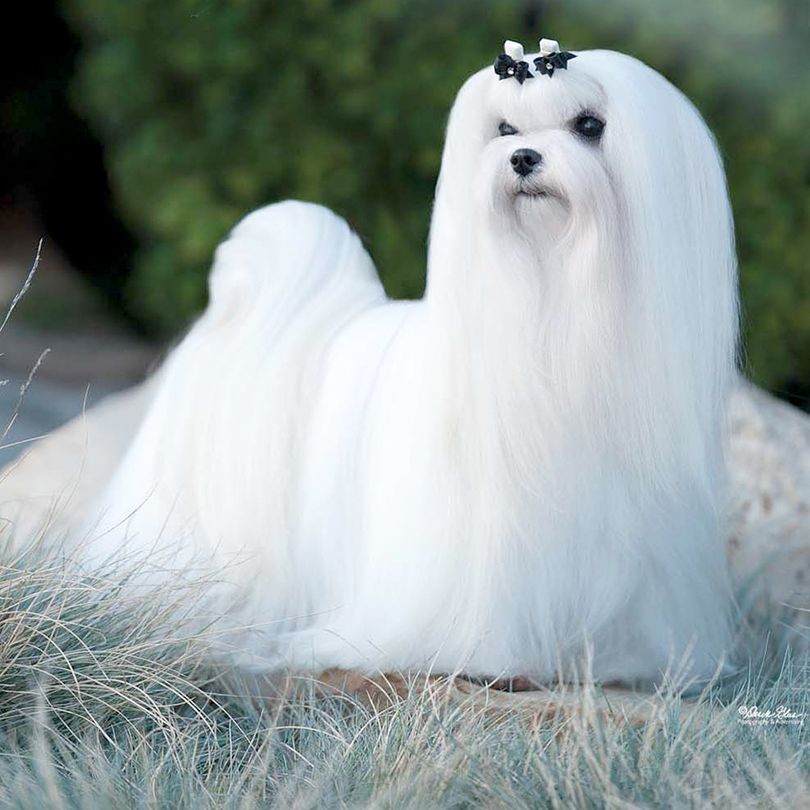Dog Breed
Maltese
Fits in your backpackLong-livedMischievousCouch PotatoHypoallergenic

- Full Name
- Maltese
- Alternate Names
- Ye Ancient Dogge of Malta
- Your PupScore
- Take the best dog breed quiz to get your Pup Scores!
- Life Span
- 15 - 18 years
- Weight
- 4 - 7 pounds
- Description
These little white snow flakes have been living their best lives in luxury since ancient times. While they are very sweet-tempered and affectionate with their family, they can be mini guard dogs, and fiercely protect their loved ones.
Despite their small size, they pack a ton of personality, and have special skills in getting what they want! The Maltese is a true companion breed, and is adaptable, can easily live in an apartment, and is a good dog for a first time owner. But just like any dog they require attention and care- the Maltese in particular requires grooming. In return you will have a dog that is not only elegant, but loyal and loving.- Origin
- MaltaItaly
- Bred For
- Lapdog
- Family Considerations
- Overall Ease of Breed
- Personality
- Home and Environment Considerations
- Physical Characteristics
Child Friendly
4/5
Is the Maltese good with children?
Yes, the Maltese is very friendly with children. We still recommend introductions to children while they are young so they get used to them, but the Maltese naturally loves children.
Stranger Friendly
3/5
Is the Maltese friendly with strangers?
The Maltese is about average in how friendly they are with strangers. They can be timid or protective, but with proper training and socialization can be fine for any household.
Dog Friendly
3/5
Is the Maltese friendly with other dogs?
The Maltese is about average in how friendly they are with other dogs. They can be timid or defensive, but with proper training and socialization can be fine for dog parks and living with other dogs at home.
Likes to Cuddle
3/5
Does the Maltese like to cuddle?
The Maltese likes to cuddle up every once in a while. They appreciate physical affection, but probably won't stay in your lap for extended amounts of time.
Playfulness
4/5
Does the Maltese like to play?
The Maltese will almost always be ready for play! The Maltese is great for a family with children, or otherwise, an environment that is always ready for play.
Service Dog Ability
2/5
Does the Maltese make a good service dog?
The Maltese would not be a great fit as a service dog for several reasons.
Ease for Novice
4/5
Is the Maltese good for first-time owners?
The Maltese is a good breed for first-time owners. A good fit for first-time owners are friendly breeds that are motivated to please their owner. This means they can be trained, and are rarely aggressive and overpowering.
Training Potential
3/5
How well can the Maltese be trained?
The Maltese is about average when it comes to training potential. The Maltese can be seen in competitions and can have advanced training, but it would require much dedication and oftentimes professional training.
Amount of Shedding
1/5
Does the Maltese shed a lot?
No! The Maltese does not shed very much, and can be an excellent fit for someone who suffers from dog allergies.
Ease of Grooming
2/5
Is the Maltese easy to groom?
The Maltese requires a good amount of grooming work. It is possible to do it yourself, but you need to plan on dedicating weekly grooming sessions at the minimum.
Exercise Need
2/5
Does the Maltese need a lot of exercise?
The Maltese requires some daily exercise, but daily walks should be enough. The Maltese appreciates going outside and on daily walks, but they will be ok without anything overly athletic.
Intelligence
3/5
How smart is the Maltese?
The Maltese has average intelligence. They are smart and witty, but do not need to be constantly challenged mentally, as some other breeds.
Amount of Barking
3/5
How much does the Maltese bark? Does the Maltese bark too much?
The Maltese barks an average amount. It can vary widely between Malteses - some may be much more expressive than others.
Guard Dog Ability
2/5
Is the Maltese a good guard dog?
The Maltese would not make a good guard dog. They can be alert, but typically do not have the desire or instinct to take on "guarding" as their job.
Tolerates Being Alone
4/5
Is the Maltese good at staying alone? Is the Maltese independent?
The Maltese prefers having family around at all times, but can also do well when left alone. The Maltese still needs plenty of attention, but is independent, and can typically be left alone for several hours without issues.
Good for Apartment Living
5/5
Is the Maltese a good apartment dog?
The Maltese is an excellent dog breed for an apartment. Some daily exercise is still important, but if they get that then the apartment will be more than enough for them to call home.
Size
1/5
How big is the Maltese?
The Maltese is one of the smallest dog breeds- suited well for apartment living and very convenient for travel.
Tolerates Heat
3/5
How much does the Maltese tolerate hot weather? When is it too hot for a Maltese?
The Maltese can tolerate some heat, but should not be over-exposed to hot weather. In general, they can live in hot weather climates, but would do best with air conditioning or at least a fan in their home, especially where they sleep.
Tolerates Cold
2/5
How much does the Maltese tolerate cold weather? When is it too cold for a Maltese?
The Maltese does not tolerate cold weather very well, and we would not recommend having a Maltese if you live in a very cold weather climate. Even if your home is warm, it can be inconvenient to go on walks, and you may need to have a sweater for your Maltese.
Potential to Run Away
2/5
Does the Maltese try to run away?
The Maltese does not have a large drive to run away. They can still be distracted and run, so precautions should be taken, but overall they have a less than average urge to run away.
General Health
4/5
Is the Maltese a healthy dog? The health of a Maltese should be measured not just by how many years they live, but also by how many health issues they've had. It is important to know which health conditions your breed is prone to- hip problems, eye problems, bloating, and arthritis are all common dog health problems.
The Maltese is very healthy, but it is still important to feed the Maltese high-quality food and to live a healthy lifestyle.
Energy Level
3/5
How energetic is the Maltese?
The Maltese has a good amount of energy and it's important to give the Maltese daily walks and ideally run time as well. A well-exercised dog is easier to train, and will be happier and have less likelihood for destructive habits.
Amount of Drooling
1/5
How much does the Maltese drool?
The Maltese does not drool at all.
Prey Drive
2/5
Does the Maltese have a large prey drive? Does the Maltese like to chase birds, cats, and other small animals?
The Maltese has some prey drive, so should not be left alone with very small animals such as birds, mice, or gerbils, but with some gradual introduction should be fine living with a cat in the same home.
Athleticism
2/5
Is the Maltese atheltic?
The Maltese can have athletic moments, and bursts of speed, but does not have the endurance as other highly athletic dog breeds. They would do great for occasional jogs, but probably not the best for long-distance runs or anything more athletic than that.
 Dog
Dog- Toy
- Bichon
- Maltese
The Maltese is a purebred dog that belongs to the Bichon sub group, which falls under the larger Toy dog breed group.
Toy group: Toy dogs are primarily characterized by their very small size. But don't let that fool you- if anything their personality and tenacity is higher than the average dog. In fact, even their protective instincts are above average! In fact, because of that it is crucial they get socialization with children and other dogs from an early age.
Perhaps out of all dog groups, the toy dog group is the most difficult to put sub-groups into, since the sub groups also include larger dogs, and fall under other groupings. For example, the Pomeranian is a Toy Spitz dog, but there are also large Spitz dogs such as the Samoyed.
Because the toy dog is both small and primarily bred for home companionship, they make excellent additions for a wide range of families. There are also practical benefits with toy dogs- they are great for apartment living, and traveling. Toy dogs are also loyal and love to cuddle, making them the ideal lap dog.
Bichon sub-group: Bichons are typically small white dogs that were previously known as Barbichon dogs. Bichon's are a very ancient dog breed, and originate from Spain, presumably from the Canary Islands.
It wasn't until the 13th century that they started being associated with royalty... a reputation that still holds today! Bichons need to be frequently groomed, but the result will be an absolutely royal looking dog.
Bichons have a hypoallergenic coat, which is smooth to the touch, making them even more of a perfect lap dog. Bichons are adaptable and friendly with children and dogs. They are focused and proud, so can make decent guard dogs. They are the ideal city dogs because of their size, confidence, and swag. On top of all of this, the Bichon can be trained fairly easily, making them an excellent option for first time dog owners.
Malteses for adoption
Similar Breeds

